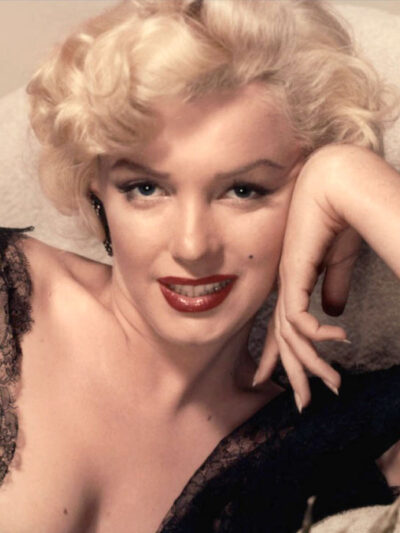 The September 2022 release of BLONDE, a Netflix feature based on the 2000 novel by Joyce Carol Oates, caps a long line of films about the late Norma Jeane Baker, a.k.a. Marilyn Monroe (1926-1962). Her appearance, with its near inhumanely expressive face, blonde bob hairdo and left cheek mole, has long since assumed immortality status, as has her first name. I doubt many people would have trouble figuring out the title of Norman Mailer’s 1973 book MARILYN! referred to a very specific individual who ranks with, and very likely outshines, 20th Century icons like Gandhi and JFK—and she’s had more movies made about her than either.
The September 2022 release of BLONDE, a Netflix feature based on the 2000 novel by Joyce Carol Oates, caps a long line of films about the late Norma Jeane Baker, a.k.a. Marilyn Monroe (1926-1962). Her appearance, with its near inhumanely expressive face, blonde bob hairdo and left cheek mole, has long since assumed immortality status, as has her first name. I doubt many people would have trouble figuring out the title of Norman Mailer’s 1973 book MARILYN! referred to a very specific individual who ranks with, and very likely outshines, 20th Century icons like Gandhi and JFK—and she’s had more movies made about her than either.
“When legend becomes fact, print the legend.”
Truthfully I’m not sure how many Marilyn Monroe based films exist, but the number might well approach that of Marilyn’s acting filmography, which (according to the imdb) clocks in at 33. As “Candle in the Wind,” Elton John’s iconic 1973 Marilyn soliloquy, states, “Your candle burned out long before your legend ever did,” and according to an equally iconic THE MAN WHO SHOT LIBERTY VALANCE (1962) line, “when legend becomes fact, print the legend.” Okay…
“Candle in the Wind” sung by Elton John
BLONDE’s take on that legend resulted in wildly mixed reviews, and the film does indeed have problems. It’s quite dour and one note, certainly, but also visually impressive and ambitious. I never quite bought Ana De Armas’ Cuban-accented Marilyn, but then no other screen interpretation has entirely convinced me, either.
I definitely wasn’t swayed by the Marilyn Monroe depicted in the previous adaptation of Oates’ text, a 2001 CBS miniseries directed by Joyce Chopra (who previously helmed the 1985 Oates adaptation SMOOTH TALK). Chopra’s BLONDE deserves points for its sincerity, and a committed lead performance by Poppy Montgomery, but the pic never overcomes its modest TV movie budget. A good try, at least.
Blonde, TV Miniseries 2001
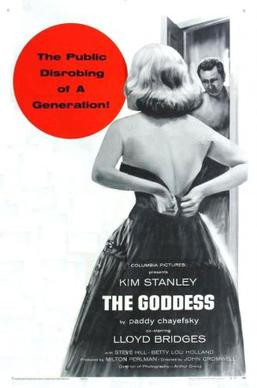 Our collective fascination with Marilyn Monroe stretches back to 1957, when Marilyn was still living, and at the height of her popularity. It was then that WILL SUCCESS SPOIL ROCK HUNTER?, a frothy comedy featuring an actress character based none-too-loosely on Marilyn (as observed by playwright George Axelrod, who had scripted THE SEVEN YEAR ITCH two years earlier), was released. The role in question was played by the late Jayne Mansfield (1933-1967), who author Donald Spoto called “a buxom platinum blonde manufactured to capitalize on Marilyn’s popularity.”
Our collective fascination with Marilyn Monroe stretches back to 1957, when Marilyn was still living, and at the height of her popularity. It was then that WILL SUCCESS SPOIL ROCK HUNTER?, a frothy comedy featuring an actress character based none-too-loosely on Marilyn (as observed by playwright George Axelrod, who had scripted THE SEVEN YEAR ITCH two years earlier), was released. The role in question was played by the late Jayne Mansfield (1933-1967), who author Donald Spoto called “a buxom platinum blonde manufactured to capitalize on Marilyn’s popularity.”
More importantly, in 1958 the Paddy Chayefsky scripted THE GODDESS was released. It features Rita Shawn (Kim Stanley), a Monroe-inspired actress who like her inspiration was born in 1926, was raised by an abusive mother, marries a short-tempered retired sports star (a boxer in place of Marilyn’s actual ex Joe DiMaggio) and then a nerdy academic (a book editor in place of Arthur Miller), becomes a huge movie star and eventually bottoms out in a haze of drugs and alcohol.
The Goddess, Feature Film 1953
The film is brilliantly scripted, as is to be expected from Chayefsky, who provides what must be counted as the best written Marilyn Monroe inspired movie to date. Yet the film has an overriding flaw, pointed out by Kim Stanley (who not incidentally essayed the lead in William Inge’s play BUS STOP on Broadway, a role played in the 1956 film version by Marilyn Monroe) herself: “I kept thinking that girl was so hopeless–she should at least try to be happy,” and added that Ms. Monroe “had a terrific sense of humor.” That of course is nowhere to be seen in THE GODDESS, or, for that matter, in nearly any of the many Marilyn-based movies that followed.
THE SEX SYMBOL, a 1974 TV movie, contains another Marilyn inspired character with a different name: Kelly Williams (Connie Stevens), whose major issue is with an unscrupulous Hedda Hopper inspired gossip columnist (an even hammier-than-usual Shelly Winters). That the film isn’t directly based on Marilyn excuses the fact that Stevens looks nothing like her inspiration, although viewers can be excused for complaining about the halfhearted attempt at period detail (a common shortcoming with these movies) in this 1957 set film, and also the air of unadorned sleaze that overhangs the project. A TV movie it may be, but the filmmakers still managed (in the European cut) to pack in some gratuitous nudity, particularly in the final scene, in which a deceased Kelly is seen in a carefully arranged breast-bearing pose.
The Sex Symbol, TV Movie 1974
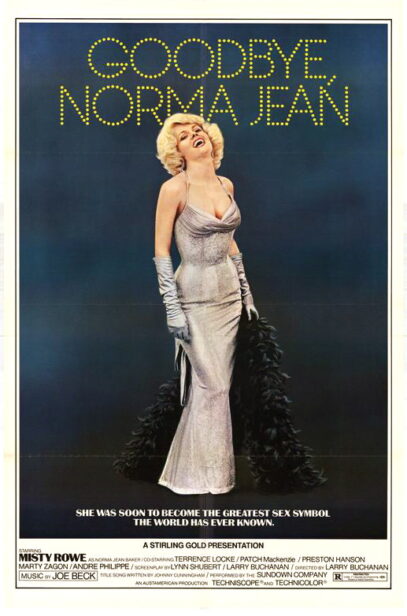 GOODBYE NORMA JEAN (1976), a no-budgeter from the late trashmeister Larry Buchanan (1923–2004), is a film whose major attribute is sleaze—meaning those who complain about the “exploitive” nature of BLONDE (either version) should probably avoid Buchanan’s film. Larry B.’s favorite actress Misty Rowe plays Marilyn in her early years, during which time she’s raped twice, pawed by a lesbian casting director and drooled over by perverts of every stripe. The film making is pretty inept, and Rowe’s attempts at “acting” are hilarious (and quite suspenseful, as the viewer continually wonders if she’ll be able to remember all her lines), with the most memorable portion being the inclusion of the Elton John tune “Candle in the Wind,” whose licensing rights would nowadays cost the entire budget of this movie.
GOODBYE NORMA JEAN (1976), a no-budgeter from the late trashmeister Larry Buchanan (1923–2004), is a film whose major attribute is sleaze—meaning those who complain about the “exploitive” nature of BLONDE (either version) should probably avoid Buchanan’s film. Larry B.’s favorite actress Misty Rowe plays Marilyn in her early years, during which time she’s raped twice, pawed by a lesbian casting director and drooled over by perverts of every stripe. The film making is pretty inept, and Rowe’s attempts at “acting” are hilarious (and quite suspenseful, as the viewer continually wonders if she’ll be able to remember all her lines), with the most memorable portion being the inclusion of the Elton John tune “Candle in the Wind,” whose licensing rights would nowadays cost the entire budget of this movie.
“Your candle burned out long before your legend ever did…”
“Candle in the Wind” is also played in the opening and end credits of the 1980 TVM MARILYN, whose subtitle THE UNTOLD STORY is misleading. Its bleak depiction of Marilyn Monroe (Catherine Hicks) hits all the familiar bases, with the major concerns of directors Jack Arnold and John Flynn seeming to be Marilyn’s attempts at improving her acting skills (as evidenced by the many scenes depicting her in acting classes). Catherine Hicks (of STAR TREK IV and CHILD’S PLAY) delivers an above-average turn as Marilyn, but her efforts are stymied by the telltale early eighties fashions and hairstyles, which fail to jibe with this supposed period piece.
Of a similar hue is the Lifetime TVM THE SECRET LIFE OF MARILYN MONROE (2015), in which Monroe, played by Kelli Garner, regales the details of her life to a psychiatrist (Jack Noseworthy) she tries to seduce. For a Lifetime movie it isn’t bad, portraying a more thoughtful and complex Marilyn than I’m accustomed to seeing onscreen, although Garner’s portrayal diverges from reality a bit overmuch (no facial mole?).
The Secret Life of Marilyn Monroe, TV Movie 2015
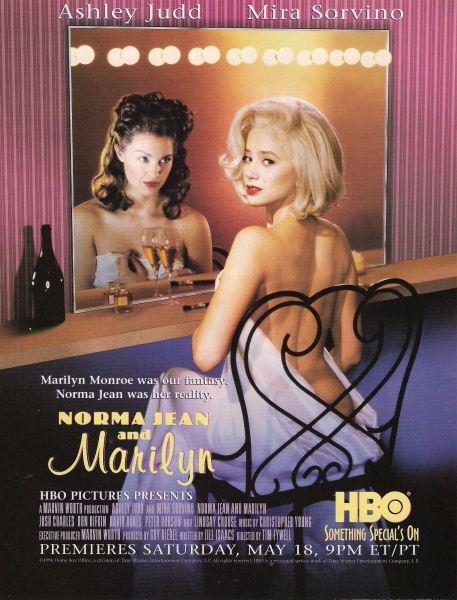 Regarding the 1996 HBO telefilm NORMA JEAN AND MARILYN, I’d place it in the same exploitation category as THE SEX SYMBOL and GOODBYE NORMA JEAN. It offers a unique (and uniquely trashy) take on the Monroe saga, with two of the hottest (in every sense of the word) actresses of the mid-nineties, Ashley Judd and Mira Sorvino, playing, respectively, Marilyn Monroe before and after she became famous.
Regarding the 1996 HBO telefilm NORMA JEAN AND MARILYN, I’d place it in the same exploitation category as THE SEX SYMBOL and GOODBYE NORMA JEAN. It offers a unique (and uniquely trashy) take on the Monroe saga, with two of the hottest (in every sense of the word) actresses of the mid-nineties, Ashley Judd and Mira Sorvino, playing, respectively, Marilyn Monroe before and after she became famous.
The film is most interesting for the radically divergent approaches taken by its leading ladies, as is most evident in the film’s approach to nudity: Judd, never one to shy away from onscreen skin-bearing, joyously parades around au naturel (and in the middle of a church service!) while Sorvino, in her one and only instance of full frontal nudity, offers up a highly solemn and portentous chest bearing. Precisely what this movie has to say about Marilyn, outside the fact that she was a conflicted soul who often got naked, I’m not sure.
HOOVER VS. THE KENNEDYS: THE SECOND CIVIL WAR is a two-part 1987 miniseries about the feud between FBI director J. Edgar Hoover (Jack Warden) and the Kennedys. Marilyn is but a supporting player, and a miscast one (Heather Thomas is quite the beauty, but not much of an actress), with the program being primarily about how Hoover used her supposed affair with Robert Kennedy (Nicholas Campbell) to his advantage. The Monroe-Kennedy connection, FYI, was furthered in a great deal of nineties-era media—see Michael Korda’s 1992 novel THE IMMORTALS, Ed Gorman’s 1995 THE MARILYN TAPES and the USA Network TVM MARILYN & BOBBY: HER FINAL AFFAIR.
The latter hails from 1993, two years after the release of Oliver Stone’s JFK. MARILYN & BOBBY was evidently trying to capitalize on that film’s success, spinning a factually questionable account of the alleged early 1960s affair between Marilyn (Melody Anderson) and Robert Kennedy (James F. Kelly), the complications from which, according to this movie, involved Jimmy Hoffa and the mob, and resulted in Marilyn’s 1962 death—and also those of Robert’s brother John and Robert himself. Not an unexciting movie, and James F. Kelly does a passable Robert Kennedy impression, but Melody Anderson’s is among the screen’s least convincing Marilyn Monroes (I’m a fan of Anderson’s work in DEAD AND BURIED, FLASH GORDON and MANIMAL, but she was wrongly cast here).
MY WEEK WITH MARILYN (2011) dramatized the story of Colin Clark (Eddie Redmayne), an assistant to Laurence Olivier (Kenneth Branagh) on the set of the 1957 Olivier-directed PRINCE AND THE SHOWGIRL, which co-starred Marilyn Monroe (Michelle Williams). Colin ended up becoming Marilyn’s confidante, and was made privy to her tormented inner world. Williams emerges as one of the screen’s premiere Marilyns, in a portrayal that may not be technically accurate but provides a fully rounded, nuance-heavy characterization.
My Week with Marilyn, Feature Film 2011
MY WEEK WITH MARILYN also deserves points for being virtually the only film mentioned here that offers a non-brooding portrayal of its subject. That, however, doesn’t entirely legitimize what is essentially a shallow wish-fulfillment fantasy (precisely how factual are Clark’s recollections? Who knows?) a la NOTTING HILL (1999).
My pick for the screen’s worst portrayal of Marilyn Monroe? That would be RELIVING MARILYN, a Canadian TVM from 2018 that tries, and fails, to dramatize the friendship Marilyn (Nadine Banville) had with her longtime make-up artist Allen “Whitey” Snyder (Morgan Blackbyrne). It’s structured as a succession of flashbacks by Whitey, occurring in the morgue where Marilyn’s corpse is interred (with the final observation that “I’ll never believe you took your own life, it was taken from you”).
Reliving Marilyn, TV Movie, THE WORST
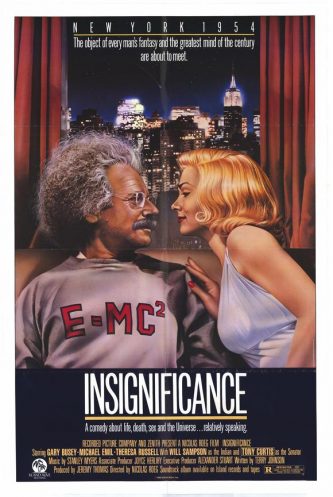 RELIVING MARILYN is a film so cheaply made and ineptly performed (you probably haven’t heard of Nadine Banville or Morgan Blackbyrne anywhere else, and there’s a reason for that) it nearly renders my criticisms of every other pic in this survey moot by comparison. I won’t belabor this film’s many problems, as excess negativity isn’t my goal; I’d much rather move on to something positive, namely what in my view is the best Marilyn Monroe based film.
RELIVING MARILYN is a film so cheaply made and ineptly performed (you probably haven’t heard of Nadine Banville or Morgan Blackbyrne anywhere else, and there’s a reason for that) it nearly renders my criticisms of every other pic in this survey moot by comparison. I won’t belabor this film’s many problems, as excess negativity isn’t my goal; I’d much rather move on to something positive, namely what in my view is the best Marilyn Monroe based film.
That would be Nicolas Roeg’s terrifically odd and elliptical INSIGNIFICANCE (1985), the only film in this survey that stands up to multiple viewings. It features Theresa Russell in one of the screen’s wildest portrayals of Marilyn; she’s actually credited as “Actress,” which is appropriate given that throughout Russell appears to be doing a highly actressy, almost drag queen-like imitation of Marilyn Monroe’s quirks and mannerisms.
Furthermore, Russell performs her role in the iconic white dress (or at least a convincing recreation of same) Marilyn wore in the legendary subway grate scene in THE SEVEN YEAR ITCH—the filming of which is alleged to have occurred just prior to the events of INSIGNIFICANCE, which has Monroe meeting up with “Professor,” a.k.a. Albert Einstein (Michael Emil), in a hotel room, and helping to inspire the theory of relativity. According to author Michael Korda, Marilyn Monroe “always knew exactly what effect she had on men, and stage-managed it carefully. Her innocence was at once real and an act,” which perfectly sums up Russell’s characterization.
Insignificance, Feature Film 1985, THE BEST
It takes a special personage to maintain the public’s undivided attention sixty years after her death. Whether our continuing obsession with Marilyn Monroe is a just one, however, remains an open question. “Let this woman rest!” proclaimed an internet commentator, and that’s a fair point, although it’s clear that us letting Marilyn Monroe rest in peace is something that just isn’t likely to happen, now or ever.
